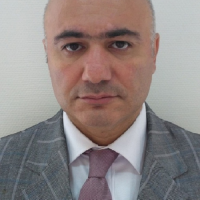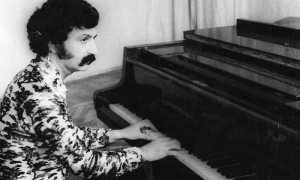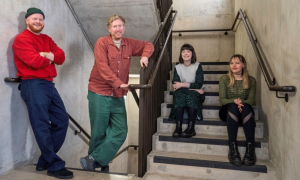Home » Jazz Articles » Profile » Vagif Mustafa-Zadeh: Azerbaijan's Jazz Pioneer
Vagif Mustafa-Zadeh: Azerbaijan's Jazz Pioneer

Mustafa-Zadeh's deep knowledge of Azerbaijani mugham and modern jazz enabled him to create a new direction in ethno-jazz; Azerbaijani jazz, or jazz mugham.
First steps in music
Vagif Mustafa-Zadeh was born on March 16, 1940 in Baku, the capital of Azerbaijan. His father, a military doctor, originally from the ancient Azerbaijani city of Sheki, was fond of music and played the tar.Mustafa-Zadeh lost his father at an early age but inherited from him a powerful intuition, passion, sense of responsibility and a strong work ethic. He owed his musical education to his mother, Zivyar Khanum, one of the first Azerbaijani pianists and an excellent connoisseur of mugham. She was a student of the founder of Azerbaijani classical music, Uzeyir Hajibeyov.
At the age of 9, the boy was already improvising with traditional music in a personal way.
At music school, he was introduced to Western classical music and performed works by composers such as Bach, Mozart, Beethoven, Chopin, Mendelssohn, Rachmaninov and others. Over time, playing the piano became the meaning of Mustafazadeh's life. The first performance on the main stage of the Baku Philharmonic Hall on May 30, 1956 became one of the brightest memories of Mustafa-Zadeh's youth. The sixteen-year-old brilliantly played the first part of Mendelssohn's piano concerto. Amazed by the performance of this young talent, the Azerbaijani conductor and composer Niyazi predicted great success for him in the future. Mustafazadeh often listened to recordings of famous American jazz musicians such as John Coltrane, Oscar Peterson, Thelonious Monk and Bill Evans, and this played an important role in the development of his musical career.
Young soloist of the Radio Committee of Azerbaijan and Moving to Tbilisi
At the age of 18, while still a student at a music school, Mustafa-Zadeh began working for the Radio Committee of Azerbaijan as a soloist. In 1964, he continued his studies at the Azerbaijan State Conservatory.However, a year later he moved to Tbilisi, Georgia, and became the musical director of the Orero ensemble. In Tbilisi, he created his first group—the jazz trio Kavkaz (the group included: Vagif Mustafa-Zadeh, Geno Nadirashvili, Felix Shabsis). One of his greatest moments came with his appearance at the XIII International Jazz Festival in Tallinn in 1966. His virtuoso performance of George and Ira Gershwin's "The Man I Love" was succinctly commented upon by the famous American jazz critic Willis Conover, who said: "He is the most lyrical pianist I have ever heard."
Creation of the vocal group Sevil and the birth of jazz mugham
In 1968, Mustafa-Zadeh embarked on his first tour of the cities of the USSR. Having achieved significant success, Mustafa-Zadeh returned to his beloved city of Baku the same year at the insistence of the Minister of Culture of Azerbaijan and composer Rauf Hajiyev. In 1970, he created the first female vocal group, Leyli. In a short time, the group became popular among the townspeople. A year later, the composition and name of the group changed to Sevil. Its repertoire was dominated by songs and melodies arranged in a jazz style. One of the four soloists of the group was his wife Elza Mustafa-Zadeh (Bandzeladze), whom he had met in Tbilisi. In addition to composing his own works, he also presented jazz arrangements of classical music by Kara Karayev , music by Tofik Bakikhanov and folk music.Mustafa-Zadeh's deep knowledge of Azerbaijani mugham and modern jazz enabled him to create a new direction in ethno-jazz; Azerbaijani jazz, or jazz mugham. For the first time, oriental music acquired a new character in the jazz style.
His passion for jazz united him with the composer and performer Rafik Babayev. In 1977, Mustafa-Zadeh created the jazz group Mugam. The last two years of his life were very fruitful, musically speaking. The Melodiya label released his double album Jazz Improvisations in 1979. His performance at the jazz festival Tbilisi 78 won great critical acclaim, with the pianist's brilliant technique and original style setting him apart. Such recognition was the fruit of his ceaseless labors—according to colleagues, he devoted himself to his music with all his heart, sparing no time or effort.
World recognition
Due to circumstances beyond his control, Mustafa-Zadeh could not make his debut on the world jazz scene for a long time. However, following recommendations, in 1979 he sent his composition "Expecting Aziza" to the World Jazz Music Competition in Monaco. There, he competed with jazz musicians from all over the world, scoring a notable success; the composition by the Azerbaijani pianist and composer won the Grand Prix. As the winner he was entitled not only to the first prize, but also to a gift of a "white piano," as a symbol of pure music, carrying peace and love for life. Sadly, however, his life was cut tragically short.Not only jazz
Of course, jazz occupied the main place in the work of this brilliant musician. His jazz compositions consisted not only of colorful national compositions. Dozens of the musician's works, such as "Blue Daniel," "Rhythm," and "Willpower" were written in the style of classical jazz traditions. It should be noted that Vagif Mustafa-Zadeh also wrote symphonic and chamber music. He was the author of numerous chamber piano pieces. In total, during his short life, he composed more than 1,200 musical works.Sudden death on stage
On December 15, 1979, Mustafa-Zadeh was on tour in Tashkent (Uzbekistan). During the first part of the concert, he felt that his fingers were no longer obeying him and he caught his breath. Despite the doctors' advice, he continued playing and performed the second part. This was Vagif Mustafa-Zadeh's last concert. He died of a myocardial infarction at the age of 39. In 1980, after his death, the host of the Jazz Time program on the Voice of America radio, Wills Conover, dedicated his entire hour-long program to Vagif Mustafa-Zadeh.World jazz stars and music critics on the work of Vagif Mustafa-Zadeh
B.B. King, while on tour in the USSR, played with him in a jam session, and later admitted that he would like to play the blues the way Mustafa-Zadeh plays.According to the Swedish pianist Jan Johansson, Mustafa-Zadeh's music was surprisingly modern, and at the same time breathes with the mysteries of ancient Caucasian melodies, sung by poets of more than one generation.
The president of the Washington Jazz Club D. Baker admitted that Vagif Mustafa-Zadeh is one of the best pianists in the world.
Pavel Brodowski, the long-time editor-in-chief of the European Jazz Federation magazine Jazz Forum, said: "Vagif Mustafa-Zadeh is a pianist who has his own, distinct style. He plays his jazz superbly, skillfully uses the Azerbaijani flavor. He can boldly be an example for many jazzmen." Mustafa-Zadeh's name was included in the World Encyclopedia of Jazz, edited by American authors.
Years later
Today, the family musical traditions continue successfully. His daughter Aziza Mustafa Zadeh followed in her father's footsteps. At the age of eight, while performing with her father at the Tbilisi 78 festival, she received a special prize. Currently, Aziza Mustafa-Zadeh lives in Germany and enjoys world renown. She regularly gives concerts in her native Baku.Vagif Mustafa-Zadeh's personality has always been a subject of debate and controversy, both during his life and after his passing. The talented musician did not obey the stereotypes created by society, and created his own rules in music. His improvisations are still analyzed by professional jazz musicians decades later. Today in Azerbaijan, the school of ethno-jazz created by Mustafa-Zadeh is developing several generations of talented musicians. Inspired by his musical heritage, these students are opening new pages in the history of jazz music. Thanks to Mustafa-Zadeh's trailblazing path, the younger generation feels that Azerbaijani jazz has the same important history as other national musical genres.
Of course, Vagif Mustafa-Zadeh became a revolutionary and a phenomenon in the history of world jazz.
A visit to Baku would not be complete without visiting the Vagif Mustafa-Zadeh House-Museum in the Old City, Icheri Sheher. Here you will be immersed in the atmosphere of jazz music of the '70s and feel the aura of magical Azerbaijani jazz created by a true genius.
Tags
Profile
Vagif Mustafa Zadeh
Mehman N Mamedov
B.B. King
Aziza Mustafa Zadeh
Baku International Jazz Festival
Comments
PREVIOUS / NEXT
Support All About Jazz
 All About Jazz has been a pillar of jazz since 1995, championing it as an art form and, more importantly, supporting the musicians who make it. Our enduring commitment has made "AAJ" one of the most culturally important websites of its kind, read by hundreds of thousands of fans, musicians and industry figures every month.
All About Jazz has been a pillar of jazz since 1995, championing it as an art form and, more importantly, supporting the musicians who make it. Our enduring commitment has made "AAJ" one of the most culturally important websites of its kind, read by hundreds of thousands of fans, musicians and industry figures every month.



























